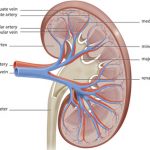 Kidney stones are stone-like formations within one or both kidneys and kidney stone symptoms are important to recognize in order to get treatment right away. Kidney stone symptoms have been described as being one of the most painful experiences a person can go through. Kidney stones don’t only affect the kidneys – in fact, they can affect the entire urinary system.
Kidney stones are stone-like formations within one or both kidneys and kidney stone symptoms are important to recognize in order to get treatment right away. Kidney stone symptoms have been described as being one of the most painful experiences a person can go through. Kidney stones don’t only affect the kidneys – in fact, they can affect the entire urinary system.
If small enough, kidney stones can easily pass through the urinary tract seemingly painless. But if too large, surgery may be required to help break them down. In many cases, a kidney stone can block a part of the urinary tract, causing pain and even urinary tract infections (UTIs).
Early warning signs of kidney stones
Advertisement
When kidney stones first emerge, you may experience back or abdominal pain. Pain can be sudden and located in the lower back where the kidneys are. Back and abdominal pain can interfere with a person’s ability to sit or stand comfortably.
Other early warning signs include changes in urine, such as the color or smell of a person’s urine can change. Some blood can also be seen in urine with kidney stones, and urine can also be cloudy.
Urination may become painful and more frequent, even if you haven’t consumed additional fluids.
Lastly, in some cases, early warning signs of kidney stones can manifest as symptoms similar to flu, as the stones cause infection, prompting fever, chills, and fatigue. Some patients may even experience nausea and vomiting as a result of the pain or an infection.
Common symptoms of kidney stones
If the kidney stones are small, minimal symptoms may be experienced, but the larger the stones the more predominant and noticeable symptoms can be. Kidney stone symptoms can result from a stone being stuck in the kidney, a stone travelling through the urethra, and a stone causing an infection.
Common symptoms of kidney stones include pain in the lower back, groin or abdomen, periods of intense pain, restlessness or inability to lay still, nausea, frequent urination, pain when urinating, and blood in urine.
Kidney stone symptoms in women and men
 Although there is plenty of overlap, symptoms of kidney stones in men and women can vary based on the differences of each gender’s urinary tract.
Although there is plenty of overlap, symptoms of kidney stones in men and women can vary based on the differences of each gender’s urinary tract.
Kidney stone symptoms in men include abdominal, groin and lower back pain, a frequent urge to urinate, blood in urine, gastric distress, fever, and chills.
Symptoms of kidney stones in women can include pain of the vulva, itching of the vulva and discharge, symptoms that are similar to ectopic pregnancy (if pregnant), ovulation/menstrual pain, cystitis, UTI, hernia, vaginitis, along with back pain, frequent urination, and blood in the urine.
Signs and symptoms of kidney stones in children
Children may experience kidney stone symptoms slightly differently than adults. Common signs and symptoms of kidney stones in children include restlessness and constant crying, changes in urine frequency and color, blood in urine, and pain.
Causes of kidney stone symptoms
Kidney stones themselves do not cause symptoms. What does onset the kidney stone symptomatology is their size or any complication they cause. For example, symptoms of kidney stones become present if an infection occurs, if the stones are travelling through the urinary tract system, or if they are blocking an area of the urinary system.
Advertisement
The location of the stone within the urinary system can play a role in symptoms, which explains the wide areas where pain can be experienced.
Sometimes, pain can last for hours and other attacks may only last for minutes. This variation in intensity is also related to where the stones are located.
By recognizing the signs of kidney stones, you can go see your doctor immediately and they can evaluate the severity of your condition and recommend an appropriate course of action to treat them.
